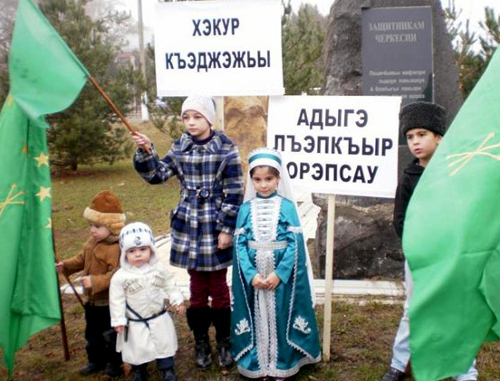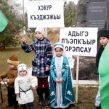
Syrian Circassians Continue Efforts to Discuss Repatriation to the North Caucasus
Publication: Eurasia Daily Monitor Volume: 9 Issue: 27
By:

On January 31, representatives of the 100,000 member Syrian Circassian community held a press conference in Nalchik, Kabardino-Balkaria. Three of the visiting Syrians said their goal was to discuss with the government the possible repatriation of Circassians from conflict-ridden Syria to the North Caucasus. The visitors preferred to remain anonymous since they were retired high-ranking government officials in Syria. The head of Kabardino-Balkaria, Arsen Kanokov, received them and promised assistance, though he did not offer any details on their visit. According to the delegation from Syria, the future of the country is becoming increasingly uncertain and people’s lives are habitually endangered. According to their count, over 1,000 of the estimated 100,000 Circassians living in Syria are willing to relocate, although the exact figures are hard to determine because of the mounting chaos in the country. “We came here on behalf of those who want to return [to the North Caucasus] to ask for help,” the delegation said. “We want to settle here” (https://www.kavkaz-uzel.ru/articles/200277/, February 1).
As the situation in Syria progressively deteriorates with no signs of improvement, Circassian activists have sought to facilitate the relocation of the Syrian Circassians to their ancestral homeland in the North Caucasus. In the 19th century, the Russian Empire purged most of the Circassian population in the region. Most of the expelled Circassians were resettled in the Ottoman Empire, which at that time extended across all of the Middle East. So Circassians may still be found in large numbers in various countries across the region. Circassian activists appealed to the International Olympic Committee and other international organizations to cancel the Winter Olympics in Sochi in 2014, saying that the area’s history was marred by the massive atrocities committed against the Circassians (see the details at https://nosochi2014.com/).
Officials in Moscow have been put in an awkward position by the continuing appeals of Circassians to organize a massive rescue operation of the Syrian Circassian community. To answer these appeals positively would have meant that Russia had recognized the grave dangers facing the civilian population in Syria. Given that Russia vetoed a United Nations Security Council resolution on resolving the situation in Syria on February 4, Moscow is hardly in a position to acknowledge the humanitarian crisis there. Another concern of Moscow is the North Caucasus itself, and since the Circassians oppose the 2014 Olympics in Sochi and the security situation in the region remains tense, Russia is going to be extremely cautious about permitting any significant repatriation of ethnic Circassians from Syria. Besides everything else, any significant influx of foreigners into the North Caucasus would breach the isolation of the region from the outside world, something that Moscow is eager to avoid. At the same time, inaction on the Kremlin’s part may further antagonize the Circassians who live in the North Caucasus, who will lose the last vestige of hope in Moscow to resolve their problems.
Ironically, it was Karachaevo-Cherkessia, where the Circassians comprise a clear minority, which immediately said it would accept Circassian refugees from Syria. The leaders of the republics in the North Caucasus appear to be cautious about meeting Syrian Circassians, probably because they are not sure of Moscow’s reaction and its policies. For its part, Moscow is trying to remain ambiguous about the possible repatriation of Syrian Circassians, neither ruling the idea out nor openly supporting it. At the same time, the Syrian Circassian delegation’s visit to the North Caucasus was probably approved by Moscow.
Beslan Khagazhei, a member of the Kabardino-Balkarian government’s commission on repatriation, said that Turkey, the US, Canada and Georgia had indicated a willingness to receive Circassian refugees from Syria. “I do not rule out that some [Circassians] will seek out not their homeland, but comfort, and will accept those offers, but our task is to help those who want to come back here,” he said (https://www.kavkaz-uzel.ru/articles/200277/, February 1).
The security situation in Kabardino-Balkaria itself, in the meantime, is not particularly stable. On February 2, a car carrying the head of the republic’s Urvan district, Antemirkan Kanokov, and a police officer came under fire. The police officer died in the attack, while Kanokov suffered serious injuries. Antemirkan Kanokov is a cousin of Kabardino-Balkaria’s leader Arsen Kanokov, who is likely to suffer a further loss of reputation because of the incident, which will fuel speculation that the president is not even able to protect his own relative from militant attacks (https://www.kavkaz-uzel.ru/articles/200379/, February 2). Another significant incident took place on February 4, when an investigator with the Russian Investigative Committee, Kantemir Kyarov, was killed in his car. Kyarov was the elder son of Anatoly Kyarov, the former head of the organized crime department of the Kabardino-Balkarian police, who was killed in Nalchik in January 2008 (https://www.kavkaz-uzel.ru/articles/200571/, February 5). Anatoly Kyarov was a major figure in the efforts of the Russian security services to hunt down the former rebel leader Anzor Astemirov. Astemirov won that struggle in January 2008 with the assassination of Kyarov in broad daylight in Nalchik, which was viewed as a huge blow to the Russian security services for two reasons. First, because Kyarov headed a special unit tasked with eliminating militants in Kabardino-Balkharia; second, because Anatoly Kyarov was a personal friend of Putin as photos of the two were widely found across the Internet (for further details on the assassination see the article by Fatima Tlisova in EDM, January 17, 2008; https://www.jamestown.org/programs/nca/single/article_id=4662&tx_ttnews%5BbackPid%5D=169&no_cache=1).
With the killing of Kyarov’s elder son, the insurgency in Kabardino-Balkaria apparently has successfully restored its strength to some extent after its leadership was wiped out last spring and now seems capable of targeting practically anyone it chooses in the republic, including the relatives of the president.
Meanwhile, as the Syrian Circassians try to escape their country, which is sinking into a full-fledged civil war, the situation back in the Circassians’ homeland in the North Caucasus is also displaying signs of a civil war, albeit a low-grade one. Moscow’s ability to suppress significant insurgent groups helps it reduce the violence somewhat. However, the situation in the North Caucasus as a whole is far from predictable, with insurgent actions increasing and subsiding periodically, while Moscow’s policy response is in general circumscribed by increasingly heavy-handed police operations.




